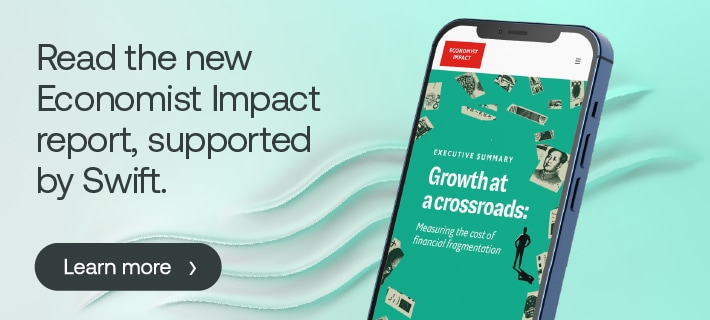A new report from Economist Impact, supported by Swift, highlights the growing cost of financial fragmentation on countries, economies, businesses, and people’s lives. Learn more about the causes and critical steps public and private sector stakeholders can take to mitigate the impact.
The global economy – and the billions of lives and livelihoods that it supports – relies on international trade and interconnected communities, businesses, and networks.
But after decades of global economic integration, this has started to come undone. The world is now facing increasing levels of financial fragmentation, the cracks of which are appearing along multiple lines.
Growth at a crossroads: Measuring the cost of financial fragmentation
Join our LinkedIn Live to hear experts from Economist Impact and Swift unpack the key findings from the report.
Understanding the drivers
In an ever-evolving global financial ecosystem, some fragmentation is simply the result of progress. Innovation, new technologies and competition are all driving positive changes that are transforming the financial landscape faster than ever.
Consumers and businesses now have more choice in how they transact than at any other time – and this isn’t slowing down. As new networks, forms of value, and methods of moving money continue to multiply, finding ways to keep these various pieces connected so that value can move seamlessly around the world is a challenge. But it’s one grounded in a shared belief that an interconnected world is a more prosperous world for all.
Other forms of fragmentation, however, come from a different place. One characterised by rising geopolitical tensions, technological decoupling and geoeconomic fragmentation. Around the world, governments are turning inward, a trend that comes with troubling economic risks and consequences. Not only does it lead to a more fractured world, as a new report from Economist Impact, “Growth at a crossroads: measuring the cost of financial fragmentation” shows, it also makes the world poorer.
The cost of fragmentation
This research, which we commissioned by Economist Impact, offers fresh data and insights into the challenges countries and their economies could face in a fragmented financial landscape.
The findings make it clear that fragmentation benefits no one. It adds friction to international trade and hinders economic growth on a global scale, with projected global GDP losses ranging from -1.2% by 2030 in the best-case scenario, to almost -6%, or the equivalent of $6.5 trillion, in the worst case.
If financial fragmentation escalates, the research shows, nearly 280 million fewer jobs would be created, innovation slows, financial inclusion efforts are stymied, and risk and uncertainty increases.
These costs are substantial, and the report highlights critical steps that public and private sector stakeholders can take to mitigate their impact.
It's not too late
A connected financial ecosystem is vital to improving economies and lives. As the report shows, it is possible to avoid the worst impacts of fragmentation. However, no one country or institution can do it alone.
The future of payments will be shaped by a diverse ecosystem of different forms of value, models, networks, providers, and technologies that will continue to expand and coexist. Facilitating integration – and the dialogue and cooperation required to build a secure, trusted, efficient and interconnected financial ecosystem – is why Swift was created and remains our mission today. Through increased international collaboration, cooperation, and a commitment to interoperability, together we can advance a resilient and interconnected global economy that benefits everyone.
Read the report
Read the Economist Impact report, “Growth at a crossroads: Measuring the cost of financial fragmentation”
Related
Swift at Sibos - Enabling global interoperability: A scalable solution
Consumers today enjoy a myriad of choices for instant payments from an evolving ecosystem of providers. But many of these solutions are designed for domestic use and lack interoperability, limiting their use cross border.
How can technologies like blockchain, tokenised assets and CBDCs, alongside globally aligned standards such as ISO 20022, help mitigate fragmentation and connect ‘digital islands’?
Discover how these innovations can herald a new era of seamless interoperability for cross-border payments, enhancing efficiency, security and global financial connectivity. Plus hear the latest on Swift’s pioneering CBDC interoperability experiments built on the foundations of rich ISO 20022 data.




